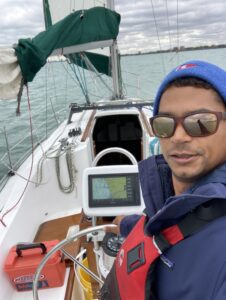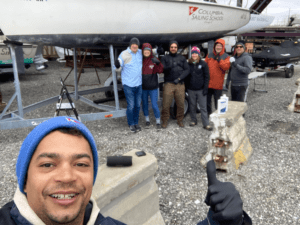In recognition of Black History Month, US Sailing sat down with Tristan Loescher, Adult Program Director at Columbia Sailing School in Chicago, to discuss his unconventional journey into sailing, the power of ‘stoke transfer,’ and his efforts to make the sport more accessible and inclusive for all.
Q: What first sparked your interest in sailing, and how did you become an instructor?
A: Growing up in Bermuda, you’re surrounded by water, and sailing was a natural part of my environment. I first had the opportunity to sail at a summer camp, and I loved it. I continued sailing for several years, but after going to boarding school, I drifted away from it for a time.
What brought me back was my passion for coaching. I had always been a coach in some form—whether it was swimming, snowboarding, mountain biking, or skateboarding. I loved what I call “Stoke Transfer”—the idea of passing on my enthusiasm for something I love to others. When Bermuda won the bid for the 2017 America’s Cup, I got involved with Endeavor, the event’s legacy sailing school. That’s when I started earning my sailing certifications and realized that coaching sailing was not only something I enjoyed but something I wanted to pursue as a career. I found it later in life, but it quickly became clear that it was where I needed and wanted to be.
Q: The Columbia Sailing School website describes it as a diverse and well-regarded program that teaches children and adults how to sail. How do you see sailing as a tool for community building in Chicago, particularly among underrepresented groups?
A: Sailing has an incredible way of bringing people together. At Columbia Sailing School, we serve a diverse community of sailors, including people from backgrounds that have traditionally been underrepresented in the sport. By providing accessible programs, scholarships, and community outreach initiatives, we’re working to break down barriers to entry.
One of the key aspects of our program is mentorship. Many of our students who begin sailing at the club enjoy their experience so much that they want to become coaches themselves. Our Counselor-in-Training (CIT) program provides a pathway for young sailors to develop their leadership skills and transition into paid coaching roles. This kind of internal growth is a testament to how sailing fosters long-term engagement and a sense of belonging.
Sailing builds confidence, fosters leadership, and creates lifelong connections—especially in a city like Chicago, where the lake is such an important part of the community’s identity. Our goal is to make sure that everyone, regardless of their background, has the chance to experience the benefits of sailing.
Q: What challenges have you faced as an instructor, and how have you overcome them?
A: One of the biggest challenges is changing the perception that sailing is an exclusive or inaccessible sport. Many people assume that you need to grow up around boats or come from a particular background to get involved, which simply isn’t the case. We actively work to change that perception by reaching out to communities, offering affordable programs and scholarships, and emphasizing that sailing is open to everyone.
Another challenge is ensuring that new sailors feel welcomed and supported. Representation matters, and we work hard to create an environment where people can see others like themselves thriving on the water. When sailors feel that they belong, they’re more likely to stay engaged in the sport. Retention is just as important as recruitment, so we focus on keeping students involved beyond their initial lessons.
Q: Can you share a memorable experience where sailing made a positive impact on someone’s life?
A: There have been so many rewarding moments as an instructor, but one that stands out was seeing an adult student go from being hesitant about stepping on a boat to confidently racing in the Chicago Beercan Series. This person had always been drawn to sailing but never thought it was something they could do. Through our program, they not only learned the technical skills but also built a community of friends who supported them every step of the way. Watching that transformation; seeing someone gain confidence and embrace a new passion, is why I do what I do.
Another unforgettable experience was being involved in the Springboard Program, a youth development initiative designed to introduce young people to maritime careers. Many of the participants were former students who first came to us through our introductory sailing programs. They had such positive experiences that they returned, eager to deepen their knowledge and explore career opportunities in the industry. Seeing those students progress from learning to sail to considering a future on the water reinforced the lasting impact of accessible sailing programs.
In my weekend keelboat class, I often see students who start out reserved, unsure of themselves on the water. By the end of the course, they’re thriving, not just surviving. It’s incredibly rewarding to see someone who was once hesitant become a confident sailor, and then, weeks later, bump into them at a race event where they’re crewing on a competitive boat.
Q: Why is it important to you that the sport of sailing becomes more inclusive, and what efforts are being made in the Chicago area to encourage diversity in sailing?
A: Sailing should be for everyone. Historically, access to the sport has been limited by economic and social barriers, but efforts are being made to change that. In Chicago, we’re expanding outreach programs, partnering with local organizations, and offering scholarships to ensure that cost is not a barrier to participation. The Counselor-in-Training (CIT) program helps sailors from underrepresented backgrounds see themselves in leadership roles within the sport. The more diverse the sailing community becomes, the richer and stronger it will be.
Q: How has the support of organizations like US Sailing influenced your work and the local sailing community?
A: US Sailing has played a key role in making sailing more accessible by providing resources, training, and opportunities like the Sailing Leadership Forum (SLF) and National Sailing Programs Symposium (NSPS). Their commitment to diversity and inclusion has helped open doors for many sailors who might not have otherwise had the opportunity.
Attending events like the US Sailing Symposiums has been a great way to connect with others in the industry, learn about new resources, and bring fresh ideas back to my program. It’s incredible to see such a strong sailing community that is committed to making the sport more inclusive. At the most recent SLF, I attended a session on making sailing more accessible for people with disabilities. That kind of knowledge-sharing is invaluable and directly impacts how we structure our programs locally.
Having a national organization support these efforts reinforces the message that sailing is a sport for everyone, and that makes a huge impact at the local level.



